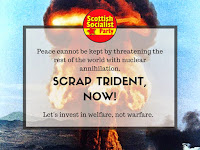 When the first nuclear bomb was detonated on July 16, 1945,
Robert J. Oppenheimer, one of the minds behind the construction of the atomic
bomb, quoted Hindu scripture from the Bhagavad Gita; “Now I am become Death,
the destroyer of worlds.” It was in that moment that Oppenheimer saw that he
had gifted humanity with the means to destroy itself. 70 years later, nuclear
weapons, the destroyers of worlds, remain situated in various countries across
the globe. Today, in 2015, there are around 16,000 nuclear weapons across the
planet, each poised to launch at any moment, ready to be deployed 24 hours a
day. We sit upon a perpetual knife edge, moments away from death, moments away
from total destruction.
When the first nuclear bomb was detonated on July 16, 1945,
Robert J. Oppenheimer, one of the minds behind the construction of the atomic
bomb, quoted Hindu scripture from the Bhagavad Gita; “Now I am become Death,
the destroyer of worlds.” It was in that moment that Oppenheimer saw that he
had gifted humanity with the means to destroy itself. 70 years later, nuclear
weapons, the destroyers of worlds, remain situated in various countries across
the globe. Today, in 2015, there are around 16,000 nuclear weapons across the
planet, each poised to launch at any moment, ready to be deployed 24 hours a
day. We sit upon a perpetual knife edge, moments away from death, moments away
from total destruction.
The only two nuclear bombs ever to be used have made the
Japanese cities of Hiroshima and Nagasaki synonymous with nuclear terror and
the lasting legacy of nuclear weapons. The initial blast literally melted the
bodies of those in the vicinity – bodies were consumed so quickly that charred
outlines of human bodies on the sides of buildings were the only signs of life
that remained. Those not immediately killed by the intense fireball created at
the heart of the blast suffered horrendously – the radioactive fallout caused
non-survivable burns, blindness, gangrenous ulcers, hair loss, vomiting, fever,
coma, bleeding from the mouth and ears. Long-term effects included cancers,
particularly leukaemia, and caused foetal abnormalities and deformities. The final death toll for the victims of
Hiroshima and Nagasaki numbers at more than 135,000. Linguist and political
scientist Noam Chomsky has described the attacks on Hiroshima and Nagasaki as
being “amongst the most unspeakable crimes in history.”
Today, nestled on the picturesque shores of Gare Loch, lies
Faslane Naval Base. This base lies just 30 miles from Glasgow, a city with a
population of over 500,000 people – Scotland’s biggest city. Trident is 1,000
times more powerful than the bomb that wiped Hiroshima off the face of the
planet. It’s a miracle that anyone in Scotland can sleep soundly knowing
nuclear war could be unleashed from that beautiful piece of Scottish
countryside.
Defenders of Trident are quick to point out that these
weapons are a “deterrent” – never to be used. This deterrent, according to
those who defend the possession of weapons of mass destruction, has created a
peaceful world, a more stable world, a more secure world. Our “independent
nuclear deterrent” has ensured peace in our time, they proudly proclaim.
I fundamentally reject the logic that tell us that peace can
be kept by force; that peace can be kept by looking down the barrel of a loaded
gun; that peace can be kept by threatening the rest of the world with a nuclear
holocaust that would make the tragedy of Hiroshima pale into insignificance. It
is the obsession with militarism and barbarity that sabotages any lasting
peace, any real understanding among the nations of the world. It is this logic
that has seen untold horror meted out by powerful nations “for the greater
good.” The harbouring of nuclear weapons projects a shameful image of our
nation to the world – an image where we do not extend the hand of friendship to
other countries, but threaten them with extinction in order to feel secure. It
is a philosophy that must be rejected.
Political elites site “national security” concerns when
trying to justify a £100 billion investment in weapons they claim we will never
use – all the while the real security of ordinary people in this country is
being continually assaulted. Ordinary people across the UK feel a deep sense of
insecurity as our social security system buckles under Tory cuts in welfare
provision. Food security in 21st century Britain is being eroded
daily, as benefit sanctions and criminally low pay have forced the working poor
to rely on food banks and pay day loans to feed themselves and their families.
Job security is vanishing with the unprecedented increase in the use of
exploitative zero-hour contracts.
Children in our cities live in a constant state of insecurity - 33% of
children in Glasgow now live in poverty. It’s time for a radical change in our
priorities.
The campaign to scrap nuclear weapons in Scotland must not
stop at our borders. We must continue to see our fight as a global struggle
against militarism and nuclear proliferation worldwide. We must see that
scrapping Trident isn’t only to rid our own shores of nuclear weapons, but it’s
a heartfelt gift to the global peace movement – a gift from the people of
Scotland to the rest of the world. It’s a way of saying “we’re with you.” I for
one look forward to the day when Scotland can take its place among the
nuclear-free nations of the world, as a responsible global citizen – where we
will extend the hand of friendship to nations across the global, in a true
spirit of internationalism. Until that day, I won’t stop saying “not in my
name.”
By Jenni Gunn
